NFORCE 780a SLI Motherboard Comparison
Onboard Devices
| Chipset | nForce 780a SLI |
| PCIe 2.0 Bridge | nForce 200 |
| Voltage Regulator | Six Phases |
| BIOS | VP.0B4 (04/072008) |
| 200 MHz HT Clock | 200.0MHz (+0.0%) |
| Clock Generator | ICS 9DB403DGLF |
| Connectors and Interfaces | Row 6 - Cell 1 |
| Onboard | 3x PCIe x16 (Modes: x16/x16/ or x16/x8/x8) |
| Row 8 - Cell 0 | 1x PCIe x1 |
| Row 9 - Cell 0 | 2x PCI |
| Row 10 - Cell 0 | 3x USB 2.0 (2 ports per connector) |
| Row 11 - Cell 0 | 1x IEEE-1394 FireWire |
| Row 12 - Cell 0 | 1x Serial Port header |
| Row 13 - Cell 0 | 1x Floppy |
| Row 14 - Cell 0 | 2x Ultra ATA (2 drives each) |
| Row 15 - Cell 0 | 6x Serial ATA 3.0Gb/s |
| Row 16 - Cell 0 | 1x Fan 4 pins (CPU) |
| Row 17 - Cell 0 | 4x Fan 3 pins (System/Power) |
| Row 18 - Cell 0 | 1x Power Button |
| Row 19 - Cell 0 | 1x Reset Button |
| Row 20 - Cell 0 | 1x CLR_CMOS Button |
| IO panel | 2x PS2 (keyboard + mouse) |
| Row 22 - Cell 0 | 2x RJ-45 Network |
| Row 23 - Cell 0 | 4x USB 2.0 |
| Row 24 - Cell 0 | 1x IEEE-1394 FireWire |
| Row 25 - Cell 0 | 2x Extrernal SATA (eSATA) 3.0Gb/s |
| Row 26 - Cell 0 | 1x DVI Video |
| Mass Storage Controllers | Row 27 - Cell 1 |
| nForce 780a SLI | 6x SATA 3.0Gb/s (RAID 0, 1, 5, 10 capable) |
| Row 29 - Cell 0 | 1x Ultra ATA 133 (2-drives) |
| JMicron JMB363 PCI-E | 1x Ultra ATA-100 (2-drives) |
| Row 31 - Cell 0 | 2x SATA 3.0Gb/s (RAID 0,1, JBOD) |
| Network | Row 32 - Cell 1 |
| Realtek RTL8111C PHY | 1x Gigabit LAN Connection |
| Realtek RTL8211BL PCI-E | 1x Gigabit LAN Connection |
| FireWire | Row 35 - Cell 1 |
| VIA VT6308P | 2x IEEE-1394a (400 Mbit/s) |
The components list looks a little shorter than the typical high-end motherboard, but that’s only because MSI forwent any onboard audio solution to instead provide a discrete sound card.
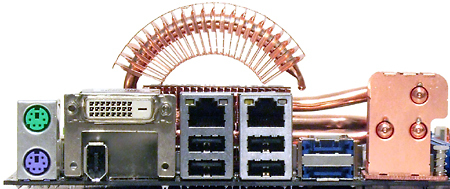
MSI added another heat pipe sink to the space normally consumed by analog audio ports. Two eSATA ports bring the board into the modern era, while to PS/2 ports help those who prefer legacy peripherals.
Missing are any analog video outputs for the onboard graphics controller, as DVI to VGA adapters require a DVI-I connector (and associated hardware) rather than the provided DVI-D. MSI does include an HDMI adapter, and the chipset provides HDMI audio support.
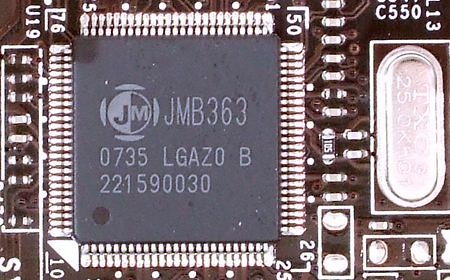
Located along the motherboard’s lower rear edge, the JMicron JMB363 is responsible for the additional Ultra ATA connector, along with eSATA connection on the port panel. Its location provides an excuse for that of the extra Ultra ATA connector, since this particular interface is easily affected by electromagnetic interference when longer trace lengths are used.
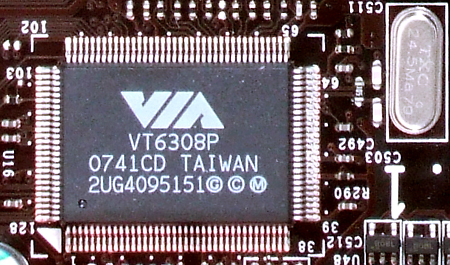
Two IEEE1394 FireWire ports are connected through a VIA VT6308P controller. Because this ancient interface is far slower than internal busses, the controller’s use of one of the chipset’s five PCI interfaces isn’t a problem.
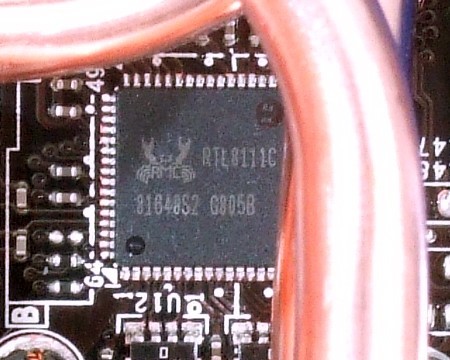
NVidia’s latest chipsets have an onboard networking controller, so MSI addresses one of its two Gigabit Ethernet ports with a simple PHY. Realtek’s RTL8111C does the job.
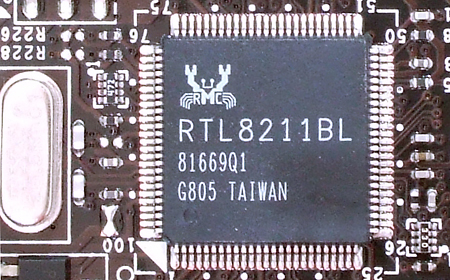
The second network port is controlled by Realtek’s RTL8211BL, which uses PCI-Express to provide full bi-directional bandwidth.
Get Tom's Hardware's best news and in-depth reviews, straight to your inbox.
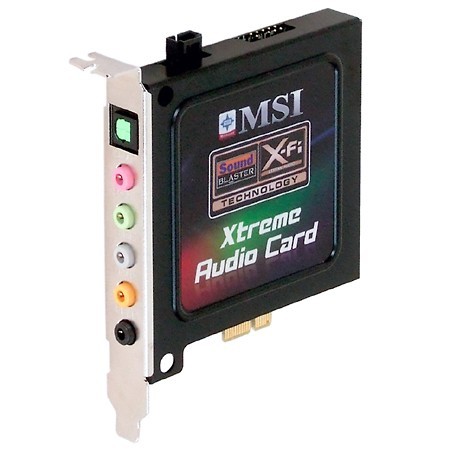
High-end users typically prefer a discrete audio solution rather than integrated codec, so MSI includes a Sound Blaster X-Fi Xtreme Audio card with all of its recent Diamond series motherboards. MSI updated this version with an aluminum RFI shield.
-
a 6pack in so after reading all this.. i think im stickin with my 790FX. i was waiting for a quite a while for nvidia to pull something here with the 780a chipset. In my eyes its a fail.Reply
AMD's 790FX chipset provides significantly more lanes than nvidia. 3-way SLI is a novel idea but at x8 lanes for 3 slots.. not so much. while amd is providing full x16 support.
good info tho. if anything i would recommend the ASRock board also for nvidia's SLI path. -
johnbilicki I wan to see boards with two 16x slots and one 4x slot. Honestly I'm not interested in 100+ FPS at 1024x768 or 1280x1024 which is what you'll get in most games with triple SLI. The MSI board looks like they could have fit a couple more USB ports next to the useless firewire port. It's 2008 and I have yet to even see a product require a firewire port on products I'm only browsing on sales sites like Newegg or even just review sites. I liked Gigabyte's new quad gigabit port motherboard, finally 8 USB ports on the back! Also if no one shows up with a router at your LAN party three of your buddies can merely connect to your system any way (and who doesn't have dual LAN ports these days besides your cheap who cheaps out by five bucks on a north bridge).Reply
What is with the waste of brackets? Give us four USB ports on a bracket. If you upgrade even only once every four or five years you probably still have about five or six brackets laying around somewhere with all the firewire ports you could ever want...and if not your buddies do.
The dual-slot coolers on single slot cards, what a waste! If you're going to use a second slot don't waste the opportunity to move that hot air the heck out of the case!
My last criticism is the i-ram...DDR-1?! I love Gigabyte when it actually bothers to make boards using chipsets I'd want (they skipped the true 16X SLI and jumped on the then useless AM2 bandwagon however). So why aren't we seeing DDR2 RAM-drives? 4x4GB/32GB would be far out of most people's budgets but a 4x2GB/16GB RAM drive at $40/$160 dimm/total would *own* a raptor raid 0 any day in price/performance.
The manufacturers need to seriously start bringing some people in to the design rooms to question WTF they're thinking with their product designs because I see no reason to bother spending any money right now.
...and to clarify I enjoyed the article itself, it's just the products I hold disappointment in. The new chipset is great overall though. -
nukemaster DDR is still faster then any hard drive interface anyway(DDR 266 @ 2128MB/s), so why not? its actually limited by its sata 150 interface not the ram(it would also max sata 300).Reply
I agree DDR2 is the way to go, but only because the price is much lower and better capacities. When gigabyte designed the I-ram ddr was cheaper and ddr2 was new and expensive.
I think there is a DDR2 I-ram in the making -
I own an evga 780i and I am plagued with the video corruption problem like many other nvidia 7 series owners. BEWARE before you invest on these boards. Nvidia hasn't released a fix in 3 months. Many people can't watch video or play games without encountering a hard lock-up.Reply
Video of problem: http: //www. youtube. com/watch?v=TYHuzJSpORw
http: //www.evga. com/forums/tm.asp?m=253891&mpage=1&key=
http: //nvidia.custhelp. com/cgi-bin/nvidia.cfg/php/enduser/std_adp.php?p_faqid=2190
http: //vip.asus. com/forum/view.aspx?id=20080407161030625&board_id=1&model=Striker+II+Formula&page=1&SLanguage=en-us
http: //forums.anandtech.com/messageview.aspx?catid=31&threadid=2178960&FTVAR_STKEYWORDFRM=&STARTPAGE=1&FTVAR_FORUMVIEWTMP=Linear
http: //digg. com/hardware/780i_nvidia_motherboard_graphics_corruption -
jabliese No comparison of just the integrated graphics? One of the selling points for the 790 is it's DX10 support, would like to see some kind of comparison between just the integrated graphics, say, maybe on HDTV playback.Reply -
unifiedonboarddecoder They should also do the test using an ATi video card. I would like to see those benchmarks as well.Reply
